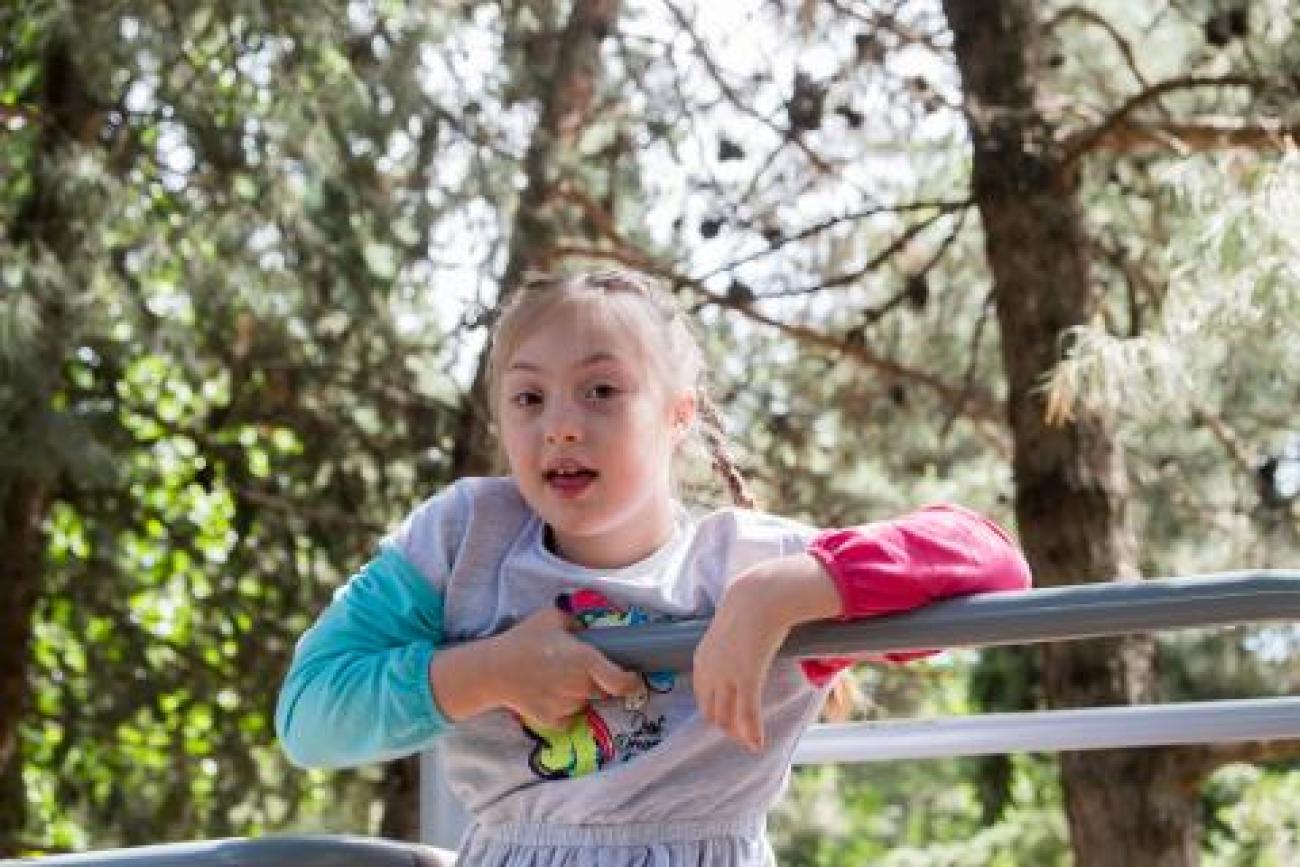Parenting during Pandemic

During COVID-19 pandemic parents of children with disabilities have to act as teachers, therapists and caregivers. UNICEF came to the aid of parents to help the
Teodora, an 11-year-old with the Down syndrome, is extremely camera-conscious. Just as she appears preoccupied with something else, she suddenly turns around, puts on a smile and strikes a pose. “Are you seeing this?” she said proudly, speaking directly to the camera, as she glided on a hoverboard a few meters forward.
A sunny day of outdoor fun has become a luxury in Tbilisi after Georgia went into a stringent lockdown to slow down the spread of COVID-19. But even now Lia Tabatadze, Teodora’s mother, cannot fully relax. She keeps working as her daughter’s coach, making sure Teodora gets the developmental exercise she needs.
Even before the coronavirus crisis hit, Tabatadze had her hands full with her job and her family and also campaigning for children with special needs. Now she has to juggle an added responsibility of home-schooling her two kids. The most demanding part of her new role is to provide proper care to Teodora.

UNICEF/GEO-2020/Khetaguri
“I have to double as everything from a speech therapist, to a psychologist to a music teacher,” said Tabatadze, who chairs Georgian Down Syndrome Association.
After watching the virus wreck far stronger healthcare systems and economies around the world, Georgia went into a stringent lockdown at an early stage of the pandemic. The nation shut down schools and businesses, introduced shelter-in-place hours, restricted intercity traffic and, at one point, even banned cars off the streets.
As a result, COVID-19 transmission went at a manageable pace, but Georgian families ended up living in a restricted, claustrophobic world that is particularly challenging for children with special needs and their parents, Tabatadze said.
The entire support network that helped children with disabilities overcome physical and cognitive challenges has sputtered away. Schools migrated online, but the switch cannot compensate for a slew of the real-world learning activities that had been available to children with special needs.
“It is harder for them to participate in online classes, to engage with teachers and other students via a computer screen.” - Lia Tabatadze
“It is harder for them to participate in online classes, to engage with teachers and other students via a computer screen,” Tabatadze said. “On top of that, everything we did beyond the school (dancing, singing and music theory lessons, the therapies) is gone. So parents need to step in to make sure kids like Teodora continue with their developmental activities.”

UNICEF/GEO-2020/Khetaguri
But parents can only do so much to replicate all those activities at home and can hardly substitute a number of professional helpers they used to rely on throughout a normal day. Nino Koridze, a homemaker and mother of four, is doing her best to make sure Andria, her 10-year-old son with Pitt Hopkins Syndrome, continues to make progress, but she knows her limits. “I’m trying to make sure he is doing at home the exercises he did at the physical therapy lessons, but it is not easy to do when you are stuck in your house. Plus, I can never really replace the professional therapist,” Koridze said.
Responding to COVID-19 emergency, UNICEF Georgia in partnership with the Georgian Government, MAC Foundation and UKAid launched a special television broadcast and a Facebook-based platform geared toward helping parents like Koridze and Tabatadze.
Aired on the First Channel of Georgian Public Broadcasting Company, TV episodes Mshoblis Dro (The Parent’s Hour) feature thematic interviews with experts and parents, who discuss topics like behavior management, teaching and learning strategies, and parental self-care. The Facebook page and group, Mshoblis Skivri (Parent’s Chest), offer a forum for discussing parents’ needs and sharing practical solutions to their challenges. The Facebook page engaged and supported more than 3,500 parents and caregivers and the TV programmes generated more than 55,000 views only on social media.

UNICEF/GEO-2020/Khetaguri
“You learn a lot from the specialists and also from other parents. It can be simple tips on how to modify exercises on processing sensory information and math to adapt them to the home environment,” Tabatadze said.
Via the broadcast and Facebook page, parents shared tips on how to cook dinner and help the kids practice math at the same time (children can count the ingredients needed for their favourite meals) or using the family album to help children learn names of their family members. Occupational therapists provided counselling to parents on planning and prioritizing their activities with children. Parents were also given an opportunity to sign up for free online consultations with therapists.
Latest Multiple Indicator Cluster Survey (MICS) revealed that 7,8 % of children have functional difficulties in at least one domain. Hence the rough estimate of children with functional difficulties is around 68 000 children in Georgia. Children with disabilities face physical, institutional and social barriers that have an adverse impact on their development and social inclusion.

UNICEF/GEO-2020/Khetaguri
“Children with disabilities are one of the most vulnerable groups in Georgian society and the burden of the COVID-19 pandemic has been heavier for these children and their families. From the onset of the pandemic, UNICEF has rushed to provide needed support and in close collaboration with our partners we launched media and online platforms to offer specific recommendations, resources and consultations for parents and caregivers to substitute offline services. We have received very good feedback from parents and will continue our support”, said Ghassan Khalil, UNICEF Representative in Georgia.
“It makes a huge difference to get counselling from professionals and also to learn from other parents’ experiences, and also to be part of a conversation,” Koridze said. “Most importantly, it is really comforting to know that someone cares about you and wants to help.”
Written by


